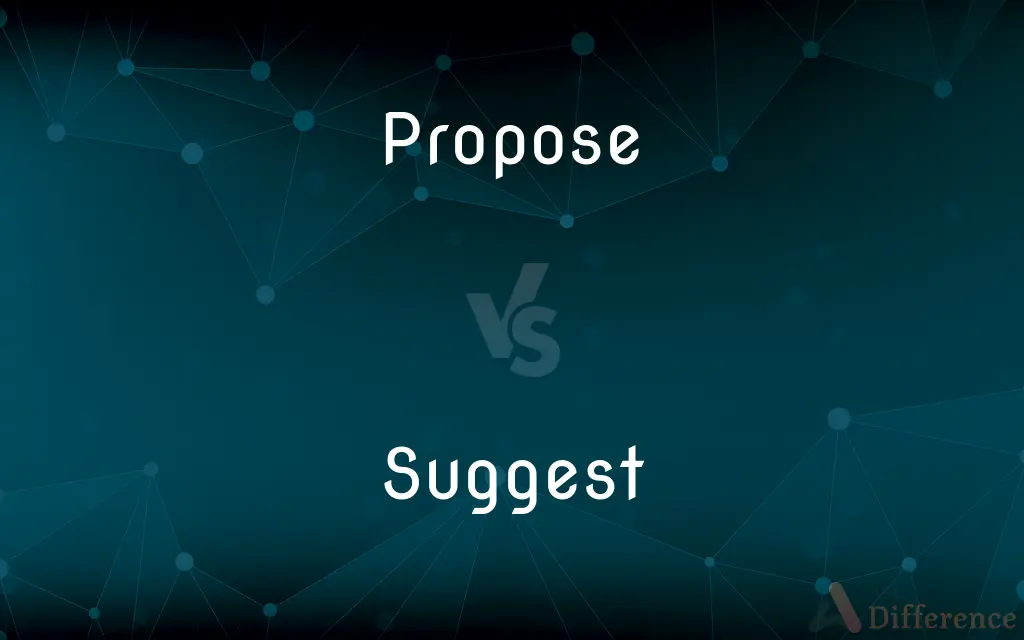Propose vs. Suggest — What's the Difference?
By Urooj Arif & Fiza Rafique — Updated on March 28, 2024
Propose involves presenting a plan or idea for consideration, often with formality, while suggest is about putting forth ideas more informally, inviting discussion or consideration.

Difference Between Propose and Suggest
Table of Contents
ADVERTISEMENT
Key Differences
When someone proposes something, they are typically offering a detailed plan or idea with a certain level of formality and commitment. For instance, a proposal in a business context might involve presenting a comprehensive plan of action. On the other hand, suggesting something tends to be less formal and more tentative, involving the sharing of an idea or possibility without the same level of detail or commitment. For example, suggesting an idea in a meeting often invites feedback and discussion rather than immediate decision-making.
Proposals are often associated with significant thought and preparation, indicating a readiness to move forward with the proposed idea. This is common in settings such as marriage proposals or project proposals in a professional setting. Conversely, suggestions can be made spontaneously and might not always be backed by a detailed plan. This makes them more flexible and open-ended, allowing for a broader range of responses.
In terms of response, accepting a proposal usually means agreeing to a well-defined plan or idea, with clear expectations on the next steps. Whereas, agreeing to a suggestion may require further discussion and development before any concrete plans are made. This distinction highlights the different levels of commitment expected when one proposes versus suggests.
Proposals are often made with the expectation of a formal response, which can be in the form of acceptance, rejection, or a request for modification. Suggestions, in contrast, might not elicit immediate formal responses and can serve as starting points for further dialogue and exploration of ideas.
While proposals can set the direction of a discussion or decision-making process due to their structured nature, suggestions can foster creativity and exploration, often leading to the generation of new ideas and solutions. This dynamic underscores the value of both proposing and suggesting in collaborative environments.
ADVERTISEMENT
Comparison Chart
Formality
Formal, with a sense of commitment
Informal, more open-ended
Detail and Planning
Involves detailed planning and presentation
May lack detailed planning; more spontaneous
Response Expected
Formal acceptance, rejection, or modification
Informal discussion, consideration, or feedback
Commitment Level
Indicates a readiness to proceed with the plan
No implied commitment to act on the idea
Context
Often used in settings requiring decision-making
Suitable for brainstorming or informal discussions
Compare with Definitions
Propose
To suggest a plan or idea with formality.
She proposed a change to the company's policy.
Suggest
To imply or indicate something indirectly.
His tone suggested he was not pleased with the decision.
Propose
To offer for discussion or debate.
The committee proposed several amendments to the bill.
Suggest
To offer advice or recommendations.
He suggested reading the manual before operating the machine.
Propose
To nominate someone for a position or role.
I propose John for the role of team leader.
Suggest
To introduce an idea or plan for consideration.
She suggested a team lunch for morale boosting.
Propose
To present for consideration or adoption.
He proposed a new strategy to increase sales.
Suggest
To bring something to mind by association.
The movie's theme suggests the impermanence of happiness.
Propose
To intend or plan (something) for a specific purpose.
They proposed the new software for managing client information.
Suggest
To make someone think about something in a particular way.
This evidence suggests a different conclusion.
Propose
Put forward (a plan or suggestion) for consideration by others
I proposed that the government should retain a 51 per cent stake in the company
He proposed a new nine-point peace plan
Suggest
Put forward for consideration
I suggest that we wait a day or two
‘Maybe you ought to get an expert,’ she suggested
Ruth suggested a holiday
Propose
Make an offer of marriage to someone
I have already proposed to Sarah
One girl proposed marriage to him on the spot
Suggest
Cause one to think that (something) exists or is the case
Finds of lead coffins suggested a cemetery north of the river
The temperature wasn't as tropical as the bright sunlight may have suggested
Propose
To put forward for consideration, discussion, or adoption; suggest
Propose a change in the law.
Suggest
To offer for consideration or action; propose
Suggest things for children to do.
Suggested that we take a walk.
Propose
To recommend (a person) for a position, office, or membership; nominate.
Suggest
To express or say indirectly
The police officer seemed to be suggesting that the death was not an accident.
Propose
To offer (a toast to be drunk).
Suggest
To make evident indirectly; intimate or imply
A silence that suggested disapproval.
Propose
To make known as one's intention; purpose or intend
Proposed to buy and run a farm.
Suggest
To bring or call to mind by logic or association; evoke
A cloud that suggests a mushroom.
A ringlike symbol suggesting unity.
Propose
To form or make a proposal, especially of marriage.
Suggest
To serve as or provide a motive for; prompt or demand
Such a crime suggests apt punishment.
Propose
(transitive) To suggest a plan, course of action, etc.
I propose going to see a film.
To propose an alliance
To propose a question for discussion
Suggest
(transitive) To cause one to suppose (something); to bring to one's mind the idea (of something).
The name "hamburger" suggests that hamburgers originated from Hamburg.
Propose
To ask for a person's hand in marriage.
He proposed to her last night and she accepted him.
Suggest
(transitive) To explicitly mention (something) as a possibility for consideration, often to recommend it
He suggests that we celebrate with dinner at Bellissimo.
He suggests our celebrating with dinner at Bellissimo.
The guidebook suggests that we visit the local cathedral, which is apparently beautiful.
Propose
(transitive) To intend.
He proposes to set up his own business.
Suggest
To seduce; to prompt to evil; to tempt.
Propose
(obsolete) To talk; to converse.
Suggest
To introduce indirectly to the thoughts; to cause to be thought of, usually by the agency of other objects.
Some ideas . . . are suggested to the mind by all the ways of sensation and reflection.
Propose
(obsolete) To set forth.
Suggest
To propose with difference or modesty; to hint; to intimate; as, to suggest a difficulty.
Propose
(obsolete) An objective or aim.
Suggest
To seduce; to prompt to evil; to tempt.
Knowing that tender youth is soon suggested.
Propose
To set forth.
That being proposed brimfull of wine, one scarce could lift it up.
Suggest
To inform secretly.
Propose
To offer for consideration, discussion, acceptance, or adoption; as, to propose terms of peace; to propose a question for discussion; to propose an alliance; to propose a person for office.
Suggest
To make suggestions; to tempt.
And ever weaker grows through acted crime,Or seeming-genial, venial fault,Recurring and suggesting still.
Propose
To set before one's self or others as a purpose formed; hence, to purpose; to intend.
I propose to relate, in several volumes, the history of the people of New England.
Suggest
Make a proposal, declare a plan for something
Propose
To speak; to converse.
There shalt thou find my cousin Beatrice,Proposing with the prince and Claudio.
Suggest
Imply as a possibility;
The evidence suggests a need for more clarification
Propose
To form or declare a purpose or intention; to lay a scheme; to design; as, man proposes, but God disposes.
Suggest
Drop a hint; intimate by a hint
Propose
To offer one's self in marriage.
Suggest
Suggest the necessity of an intervention; in medicine;
Tetracycline is indicated in such cases
Propose
Talk; discourse.
Suggest
Call to mind or evoke
Propose
Make a proposal, declare a plan for something
Propose
Present for consideration
Propose
Propose or intend;
I aim to arrive at noon
Propose
Put forward; nominate for appointment to an office;
The President nominated her as head of the Civil Rights Commission
Propose
Ask (someone) to marry you;
He popped the question on Sunday night
She proposed marriage to the man she had known for only two months
The old bachelor finally declared himself to the young woman
Common Curiosities
What is the main difference between propose and suggest?
Proposing involves presenting a detailed plan with a certain level of formality, whereas suggesting is about offering ideas more informally and without detailed planning.
Which is more appropriate in a business meeting, proposing or suggesting?
It depends on the context and the nature of the meeting; proposing is suited for formal decision-making, while suggesting is ideal for brainstorming and preliminary discussions.
Is suggesting always informal?
Suggesting tends to be more informal than proposing, but it can be presented in a structured manner depending on the context.
Are suggestions taken as seriously as proposals?
Suggestions might not be taken as seriously as proposals due to their informal nature and the lack of detailed planning.
Can both terms be used interchangeably?
In informal contexts, they might be used interchangeably, but in formal settings, their differences in commitment and detail make them distinct.
Is it common to propose something without prior discussion?
While proposals generally involve some level of prior discussion, they can be introduced as new ideas needing formal consideration.
Can suggest be used to indicate something indirectly?
Yes, suggest can be used to imply or indicate something indirectly without stating it explicitly.
Can a suggestion become a proposal?
Yes, a suggestion can evolve into a proposal after it is further developed and detailed planning is added.
Is proposing more serious than suggesting?
Generally, yes, because proposing often comes with a level of commitment and preparation that suggesting does not.
Do both propose and suggest require an immediate decision?
Proposals often prompt an immediate decision, while suggestions may lead to further discussion without the need for an immediate decision.
How do cultural differences impact the use of propose vs. suggest?
Cultural differences can influence the perception of formality and commitment associated with proposing and suggesting, affecting their use in different contexts.
How do recipients typically respond to proposals?
Responses to proposals are usually formal, requiring acceptance, rejection, or requests for modifications.
Why is suggesting considered more open-ended than proposing?
Because suggestions invite further discussion and do not commit to a specific plan of action as proposals do.
Can a proposal be modified after being presented?
Yes, proposals can be modified based on feedback, whereas suggestions are inherently more flexible.
How does the level of detail differ between a proposal and a suggestion?
Proposals are typically detailed and well-thought-out plans, while suggestions may lack detailed planning and be more spontaneous.
Share Your Discovery

Previous Comparison
Plaid vs. Stripe
Next Comparison
Lig vs. PigAuthor Spotlight
Written by
Urooj ArifUrooj is a skilled content writer at Ask Difference, known for her exceptional ability to simplify complex topics into engaging and informative content. With a passion for research and a flair for clear, concise writing, she consistently delivers articles that resonate with our diverse audience.
Co-written by
Fiza RafiqueFiza Rafique is a skilled content writer at AskDifference.com, where she meticulously refines and enhances written pieces. Drawing from her vast editorial expertise, Fiza ensures clarity, accuracy, and precision in every article. Passionate about language, she continually seeks to elevate the quality of content for readers worldwide.














































